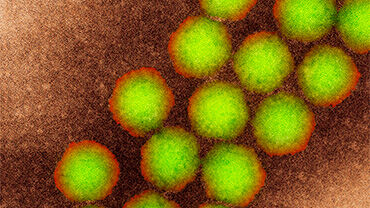WHO statement: 12th meeting of the Emergency Committee under the International Health Regulations Emergency (IHR) regarding the international spread of poliovirus
The conclusions of the IHR Emergency Committee do not change the ECDC risk assessment for Europe.
Overall the Committee was encouraged by steady progress in Pakistan and Afghanistan, and was reassured and impressed by the rapid response of the polio eradication programme in Nigeria. The committee welcomed the dedication in Pakistan to further strengthen surveillance, and in particular the expansion of environmental surveillance to improve detection. The Committee also applauded the information that there were no fully inaccessible children in 2017. However, the recent exportation of WPV1 from Pakistan into Kandahar province of Afghanistan illustrated the difficulty of halting international spread between these two countries. While the Committee applauded the efforts of Afghanistan to reach inaccessible children and noted the overall reduction in these numbers, the continuing insecurity in parts of Afghanistan means that substantial numbers of children remain inaccessible. The Committee welcomed the continued emphasis on cooperation along the long international border between the two countries noting that this sub region constitutes an epidemiological block.
The Committee commended Nigeria for its rapid response to the WPV1 cases and welcomed that there had been no further cases detected since the last meeting. However, as there remain substantial populations in Northern Nigeria that are totally or partially inaccessible, the committee concluded that it is highly likely that polioviruses are still circulating in these areas. There was ongoing concern about the Lake Chad region, and for all the countries that are affected by the insurgency, with the consequent lack of services, and presence of Internally Displaced Persons (IDPs) and refugees.
Equatorial Guinea remains vulnerable, based on very sub-optimal polio eradication activities including poor surveillance, low routine immunisation coverage, and waning national efforts to address this vulnerability. The committee was very concerned that two new outbreaks of cVDPV have been identified, one in Sokoto in northern Nigeria, and the second in Quetta Pakistan. The Committee welcomed the provision of information by the Russian Federation at the meeting about the recent detection of VDPV in two children from the Chechen Republic, and also welcomed the surveillance and immunization activities taken to date in response. The Committee unanimously agreed that the international spread of polio remains a Public Health Emergency of International Concern (PHEIC) and recommended the extension of the Temporary Recommendations for a further three months.
ECDC comment on the risk to Europe
The conclusions of the IHR Emergency Committee do not change the ECDC risk assessment for Europe. The continuing circulation of wild poliovirus in ten countries shows that there is a continued risk for the disease being imported into the The upsurge of human cases in China during the winter 2016-2017 due to A(H7N9) gives cause for concern. EU/EEA.
ECDC previously concluded that in the event of importation of wild-type poliovirus resulting in the re-establishment of virus circulation in the EU, the overall risk to EU residents would be:
- very low in OPV-vaccinated populations for both poliovirus infection and disease;• moderate in IPV-only cohorts for poliovirus infection and very low for disease; and
- high in low- or unvaccinated groups for poliovirus infection and moderate for disease.
ECDC endorses the temporary recommendation of WHO and suggests the following options for intervention to EU/EEA Member States:
- Revise polio vaccination advice to EU travellers and residents to the affected countries, and in particular to Pakistan.
- Advise travellers to, and EU residents in, polio-affected countries to have an additional IPV dose within 12 months from planned travel to polio-affected countries.
- Prioritise assessment of polio vaccination uptake at the national, subnational and local levels, and the identification of vulnerable and under-vaccinated populations; efforts should be increased to improve vaccination coverage to 90 per cent in accordance with national or regional immunisation recommendations.
- Assess the vaccination status of refugees and migrants from polio-affected countries at the time of entry into the EU/EEA; people not vaccinated against polio or other diseases should be offered age-appropriate vaccinations and in accordance with the host country’s vaccination schedule. ECDC continues to support the EU-wide response to the threat of poliovirus spreading across Europe and will, upon request, support individual EU Member States in all areas related to their preparedness, e.g. the detection and control of poliovirus importations.
Read more: Full WHO statement





